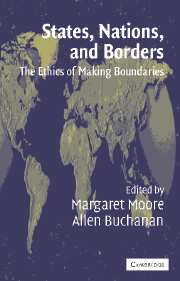Book contents
- Frontmatter
- Contents
- About the Contributors
- Acknowledgments
- 1 Introduction: The Making and Unmaking of Boundaries
- THE JEWISH TRADITION
- THE CONFUCIAN TRADITION
- THE CHRISTIAN TRADITION
- 6 The Christian Tradition
- 7 Christianity and Territorial Right
- THE NATURAL LAW TRADITION
- THE ISLAMIC TRADITION
- THE LIBERAL TRADITION
- THE INTERNATIONAL LAW TRADITION
- CONCLUSION
- Index
6 - The Christian Tradition
Published online by Cambridge University Press: 24 November 2009
- Frontmatter
- Contents
- About the Contributors
- Acknowledgments
- 1 Introduction: The Making and Unmaking of Boundaries
- THE JEWISH TRADITION
- THE CONFUCIAN TRADITION
- THE CHRISTIAN TRADITION
- 6 The Christian Tradition
- 7 Christianity and Territorial Right
- THE NATURAL LAW TRADITION
- THE ISLAMIC TRADITION
- THE LIBERAL TRADITION
- THE INTERNATIONAL LAW TRADITION
- CONCLUSION
- Index
Summary
Principles
Since it first emerged as a “world religion,” Christianity has taken several forms, some of which have had widely differing and mutually hostile views over the territorial rights of peoples. In particular, the two major intellectual Christian traditions, Augustinianism and Thomism, have given very different degrees of importance to the place that humankind occupies in the world. In this chapter, I shall be concerned with the Catholic tradition, which, since the sixteenth century, has meant increasingly the Thomist, and opinions on the question of the making and unmaking of boundaries. I shall also concentrate on the period from roughly the late Middle Ages until the end of the seventeenth century.
Christian principles and Christian ethics have always been present in nearly all European discussions on the legal and political issues, which questions of territorial sovereignty inevitably raise. But it is also the case that the terms in which those question have been discussed since the early eighteenth century have been largely secular. Between the mid-sixteenth century and 1648, nearly every European state was engaged in some kind of confessional conflict. These wars divided peoples and families. They were the first to be fought along ideological lines, and they wholly transformed the map of Europe. The Treaty of Westphalia of 1648 brought to a close the last of these great international conflagrations, known as the Thirty Years War. It also crucially put an end to the role of the Papacy – the only interested party to reject the Treaty – as an agent of international arbitration, and established once and for all the principle of eius regio, cuius religio, the principle that every sovereign had the right to decide what form of Christianity would be practiced within his own borders.
- Type
- Chapter
- Information
- States, Nations and BordersThe Ethics of Making Boundaries, pp. 103 - 126Publisher: Cambridge University PressPrint publication year: 2003
- 1
- Cited by



